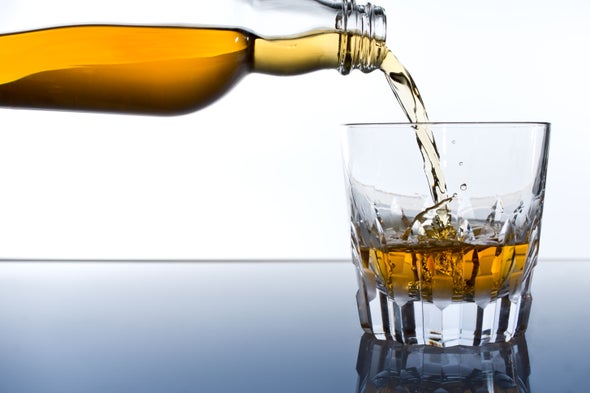(单词翻译:单击)
听力文本
This is Scientific American's 60-second Science, I'm Eliene Augenbraun.
"It came to our attention a few years ago that there were fraudulent whiskeys on the market."
Gordon Cook of the Scottish Universities Environmental Research Center.
"Scotch whiskey is Scotland's product, and we felt that being a radiocarbon laboratory in Scotland, we should take a lead on this."
Scotch whiskey is made from barley, which absorbs carbon dioxide from the air as it grows. Most of the carbon is carbon-12. But a small percentage is the radioactive isotope carbon-14, which decays at a constant, known rate— and has therefore long been used to "carbon-date" biological samples.
"Then, in the early 1950s, we had the start of the atmospheric weapons test, and these produce carbon-14. By 1960, you were twice the natural level. And '63—there was a test ban treaty, so '63 was the maximum. Since then, the level in the atmosphere has decreased as the radiocarbon goes into the biota and the oceans."
So unusually high levels of carbon-14 are associated with barley grown during the years when nuclear testing was widespread.

There's obviously a lot of money in whiskey. And some classics get bought not as imbibements but as investments. Last October, a 60-year-old 1926 bottle was auctioned off for $1.9 million.
To make sure that the stuff inside bottles of Scotch whiskey matches what's on the labels, Cook and his colleagues looked at levels of the carbon-14 in the drink. They calibrated levels of the radioactive variant of carbon in more than 200 different single-malt Scotch whiskey samples of known ages. The researchers then compared those levels to eight whiskeys claiming to have been bottled from 1847 to 1978.
"We haven't found any whiskeys purported to be from the 19th century that are genuine."
Because those allegedly 19th-century bottles contained material clearly produced during the nuclear-testing era. The study is in the journal Radiocarbon.
Cook hopes these verification techniques will help keep the whiskey business true to the words of Robert Burns: "Here's a bottle and an honest friend."
For Scientific American's 60-second Science. I'm Eliene Augenbraun.
参考译文
这里是科学美国人――60秒科学系列,我是艾琳·奥根布劳恩。
“市场上存在假威士忌,这在几年前引起了我们的注意。”
苏格兰大学环境研究中心的戈登·库克说到。
“苏格兰威士忌是苏格兰的产品,作为苏格兰的放射性碳实验室,我们应该带头研究这个问题。”
苏格兰威士忌由大麦制成,而大麦在生长过程中会吸收空气中的二氧化碳。其中大部分碳是碳12。而放射性同位素碳14只占一小部分,它以一种已知的恒定速率衰变,因此长期以来一直被用于生物样品的“碳素年龄测定”。
“之后在上世纪50年代初,我们开始进行太空武器测试,这会产生碳14。到1960年,大气中的碳14含量为自然水平的两倍。但1963年出台了禁止试验条约,因此碳14含量在该年达到最大值。从那以后,随着放射性碳进入生物区和海洋,大气中的碳14含量逐渐下降。”
因此,碳14水平异常高与在核试验扩散年代生长的大麦有关。
显然,威士忌中有大量金钱。一些经典威士忌被购买并不是为了饮用,而是为了投资。去年10月,一瓶有1926年生产的60年威士忌以190万美元的价格被拍卖。
为了确保苏格兰威士忌酒瓶中的物质与标签相符,库克和同事查看了酒中的碳14含量。他们校准了200多种已知年份的单一麦芽苏格兰威士忌样品中的放射性碳变种水平。之后,研究人员将这些含量与声称于1847年到1978年间装瓶的8种威士忌进行了比较。
“就这些声称产于19世纪的威士忌而言,我们尚未发现任何一瓶是真货。”
因为那些声称是19世纪的酒瓶里,明显含有产于核试验时期的物质。这项研究发表在《放射性碳》期刊上。
库克希望这些验证技术能帮助威士忌酒厂忠于罗伯特·伯恩斯的名言:“这是一个瓶子和一位诚实的朋友。”
谢谢大家收听科学美国人——60秒科学。我是艾琳·奥根布劳恩。
译文为可可英语翻译,未经授权请勿转载!
重点讲解
重点讲解:
1. be made from (由…)构成的;(由…)制成的;
Wine is made from grapes.
葡萄酒是用葡萄做的。
2. be associated with 有关联的;相关的;
This syndrome is associated with frequent coughing.
这种综合征与经常咳嗽有关。
3. auction off 拍卖掉;
Her dresses will be auctioned off for charity.
她的衣物将被拍卖以资助慈善事业。
4. make sure 一定要;设法保证;
Please make sure all mobile phones are switched off during the performance.
请确保演出时关上所有手机。


